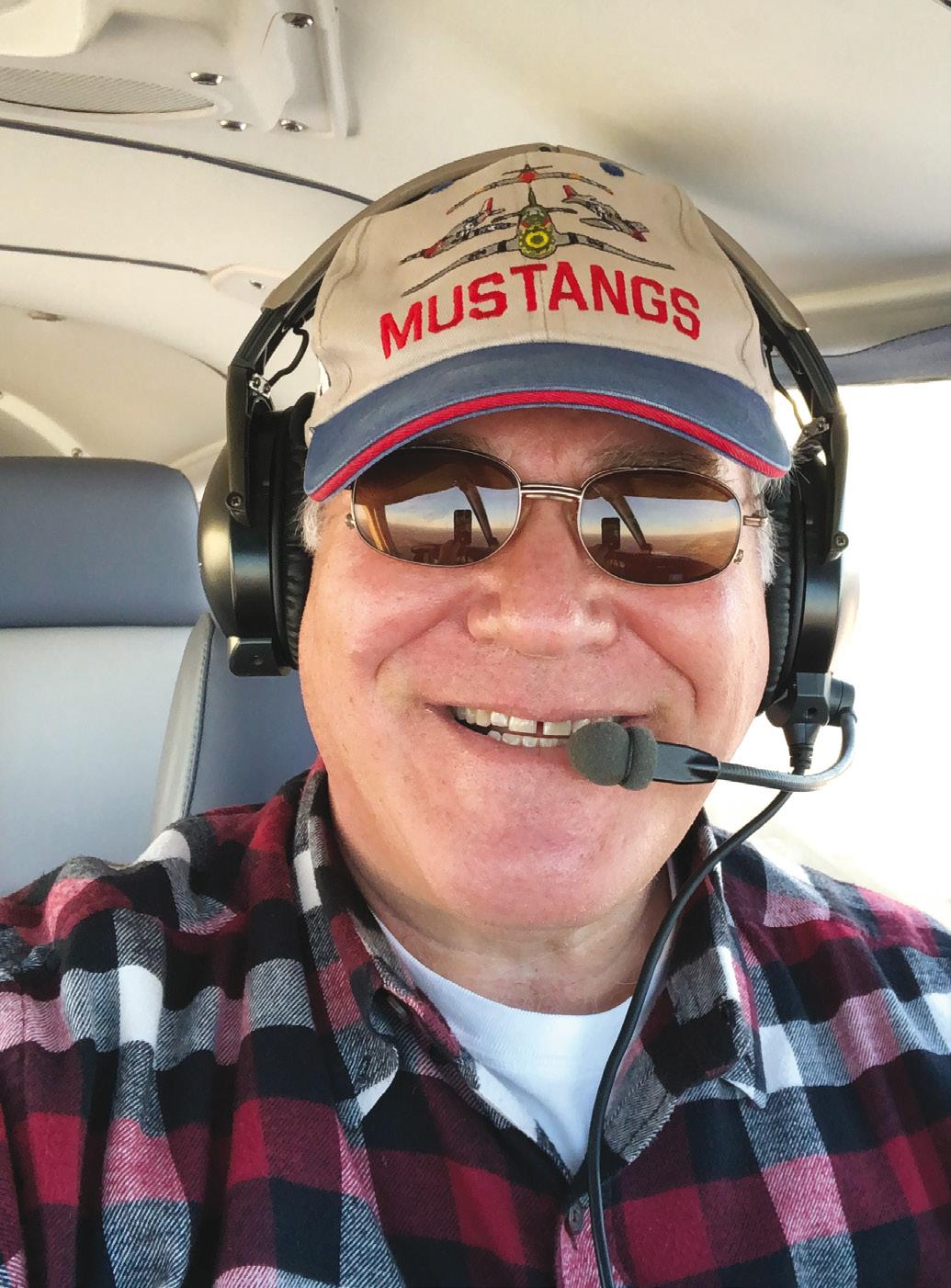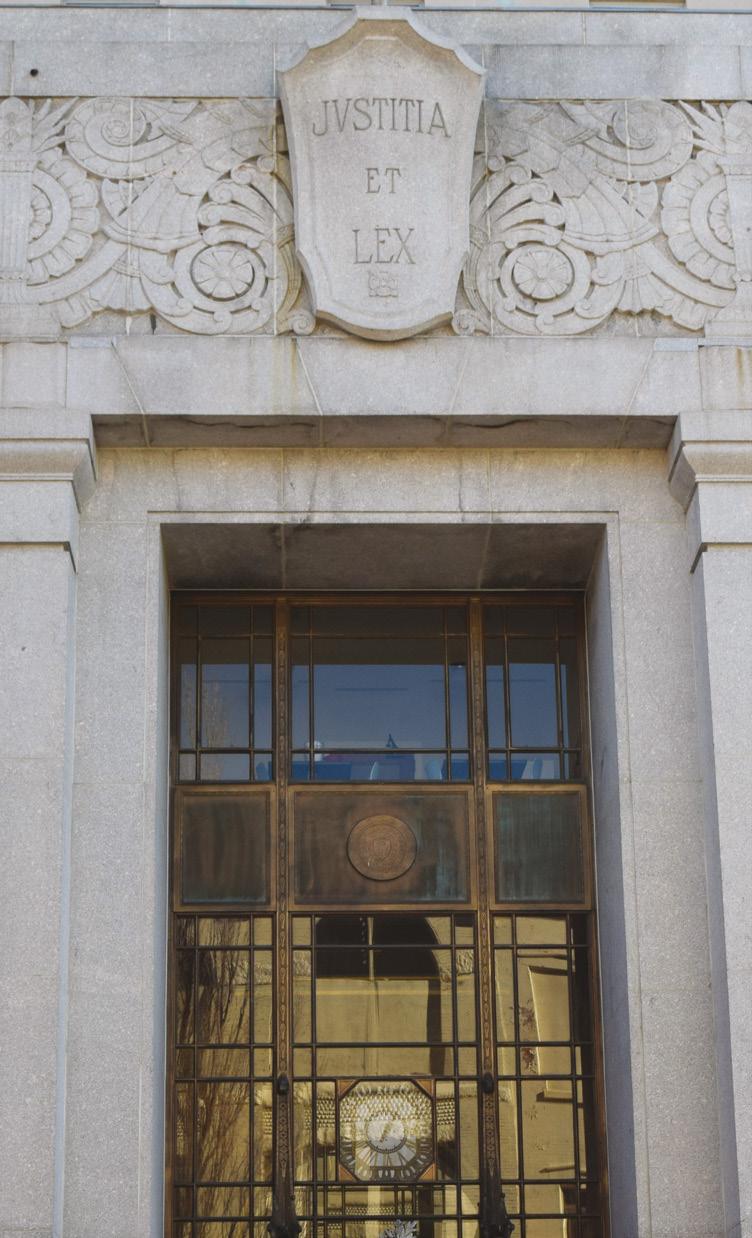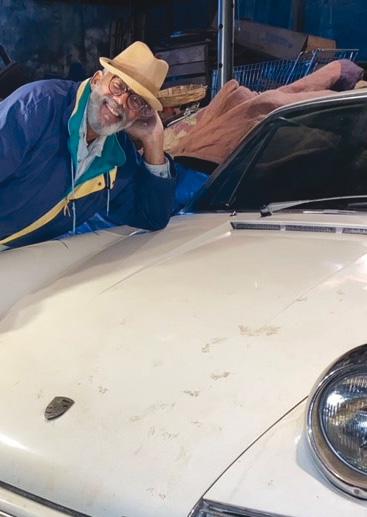
11 minute read
Engineering Access to Justice
By Donald F. Smith, Jr., Esquire

When he’s not volunteering, Jesse L. Pleet is often in the cockpit of his 1973 Piper Cherokee. Jesse L. Pleet and William C. Matthews, II have each been recognized by the Pennsylvania Bar Association for their volunteer work, above the norm, with the Eviction Prevention Project being conducted in the courtroom of Magisterial District Judge Tonya Butler.
Beginning on September 9, 2020, the project has had more than ten attorneys participate, giving of their time on an as-needed basis to help tenants facing eviction. Also present for the hearings have been Kimberly Talbot, Executive Director of Reading’s Human Relations Commission, and representatives of the Berks Coalition to End Homelessness to take applications for rental assistance. The project has received statewide recognition for its success.
Judge Butler praises the program: “Having the Eviction Prevention Project with attorneys, such as Attorneys Pleet and Matthews, in court to represent tenants has been such a blessing. They are empathetic to what is going on in Reading and are able to provide hope to the parties. Equally important, these attorneys provide the necessary resources and education on available rental assistance programs. Landlords and tenants have equally benefitted from the project and the involvement of the attorneys.”
Of the volunteering attorneys assisting in the program, Will and Jesse have logged the most hours and have taken on difficult cases, mediating them successfully. Therefore, at the Bar Association’s Annual Meeting in October, David

Jesse Pleet cruising at an altitude of 3,000 feet during a recent flight near Hershey, Pa.
Trevaskis, the PBA’s Pro Bono Coordinator, announced that the two were recipients of the PBA’s 2021 Pro Bono Award.
Jesse, our Association’s 2015 President, was born and raised in Lebanon County, but his connection to Berks County began at a young age when he started to attend Camp Conrad Weiser. As an eight-year-old, it was at the Camp that Jesse learned to shoot, beginning with BB guns, then a .22 long rifle and advancing, as a teenager, to shotguns with trap shooting.
He became a sharpshooter, and, while a student at Pennsylvania State University, Jesse lettered on the varsity rifle team and served as a student patrol officer on campus. Not limiting himself in extracurricular activities, the future lawyer was in the Blue Band. He played the saxophone in the famous marching band and clarinet in the concert band, achieving third-chair status as a freshman.
Upon graduation, the accounting major was unsure of his career choice. Thinking of entering law enforcement, he attended Alvernia College at night for a year, accumulating thirty credits in criminal justice. During the day he worked in his father’s Lebanon clothing store.
Finally, he saw the light and matriculated at the Delaware Law School in 1978.
Following his first year of law school, he had a summer internship with the Pennsylvania Department of Revenue tasked with researching inheritance tax law. “I did not like what I was doing.”
Back at school, he came to be inspired by two guest lecturers. “I was mesmerized by the accomplishments of A. Charles Peruto, Sr., a high-profile criminal defense attorney.” On the civil side, “I found the stories told by Paul Anapol, a famous Philadelphia trial attorney, to be amazing.” Jesse caught the bug and convinced Mr. Anapol to allow him to work parttime with his firm during Jesse’s third year of law school.


Refer your matters with confidence.
Daniel E.P. Bausher, Esq.
When at their most vulnerable, your clients need a personal injury lawyer they can trust. With nearly 40 years of experience, Dan will work to make sure your clients receive the help they need. 3 Workers’ Compensation 3 Auto Accidents 3 Construction Accidents 3 Insurance Disputes 3 Product Liability 3 Wrongful Death
Free Initial Consultation • No Recovery, No Fee 610.478.2002 l www.personalinjurypros.com
A Holistic Approach to Employee Benefits
Power Kunkle delivers localized, high-touch services: Dedicated Client Relations Manager • Administration Support Services ACA Compliance Support • Benefits Compliance Review
Human Resource Solutions: Talent Recruitment • HR Compliance Audit • Employee Handbook Review Compensation Analysis • Training • General Human Resource Support
Wellness & Health Promotion:
Surveys and Assessments • Biometric Screenings • Education Program Development & Incentive Tracking • Wellness Policy Review Worker’s Compensation & Safety Integration www.PKBenefits.com • 1-866-685-1790 • contactus@pkbenefits.com
Continued from page 9
Once armed with a law degree in 1981, Jesse began a judicial clerkship in Lebanon County. After one year of clerking, “I knew I wanted to be a trial attorney. I was so impressed with the preparation of the insurance defense attorneys.”
So, knowing David M. Kozloff from his Camp Conrad Weiser days, Jesse joined Dave’s firm, Kozloff, Diener, Turner & Payne at the time, in 1982. Two years later he had his first insurance defense trial, and he averaged four to five trials annually thereafter. He became partner in 1986.
Eventually, Jesse decided to strike out on his own and started his own firm in 1994. He retired from the practice of law at the end of 2020 after several years of being a partner at Leisawitz Heller.
The father of three daughters, Jesse is an avid skier and a licensed pilot, having his own plane since 1986. He has flown extensively, west as far as Wisconsin, north to Nantucket and south to North Carolina and many places in between.
Jesse has always been committed to doing pro bono. A long-time member of the PBA’s Committee on Legal Ethics and Professional Responsibility, he takes Rule 6.1’s obligation to “render public interest legal service” to heart. “I never wanted to pay the opt-out fee, even when my last firm would have done so.” Instead, he took his turn at MidPenn Legal Services to help low income clients.
The former president also cites the Bar Association’s expressed Mission of striving “to support the community by… assuring access to justice…” Jesse explains, “Lawyers should embrace a way to give back.”
But in retirement? “I am in my bonus years and want to help with this noble Eviction Prevention Project. I am not willing to fade away, having so much experience. It is about just being there with the tenant; otherwise, the eviction hearing is a scary time for them.”
Jesse is a seasoned member of the Berks County Bar Association’s Alternative Dispute Resolution panel. Those mediation skills, combined with the advocacy skills he has acquired over many years of trial work, have made him an integral part of the Eviction Prevention Project’s success.
Like Jesse, Will Matthews is not a Berks native, but since living in Berks, he has felt a need to become active in pro bono work. When attorneys were being recruited to participate in the Eviction Prevention Project, “I thought this was an ideal opportunity for me, right down my alley of interests. As a landlord myself, I know the landlord side, and I know enough of the tenant side to attempt to bring the sides together.” Law was not Will’s first career choice as he went off to college. Raised in Chester County, Will, an African American, had attended mostly white elementary and secondary schools. When it came time to pick a college, “my parents wanted me to go to a predominately Black school, to be immersed in a culture different from what I had encountered in the past.” So, he went to Lincoln University. “My four years there were an enlightening, robust and enjoyable time. When I look back on my college experience, it is with a great deal of satisfaction.” It turned out to be life changing. He had gone to college intending to become an engineer. “During my first year I took a course taught by an attorney who had a profound impact on me. I remember him saying, ‘Being a lawyer presents unique opportunities. The critical thinking method you learn in law school prepares you for any endeavor in life.’ Upon hearing that, I decided to become a lawyer.”
Following graduation from Lincoln, Will entered Howard University School of Law, following in the undergrad and graduate “footsteps of Thurgood Marshall.” Concentrating his studies in commercial and corporate law, and earning a spot on the Howard University Law Journal as technical editor, Will graduated in 1977.
He returned home and went to work with a newly formed Chester County law firm of “two young Black attorneys with a retired judge.” A year later he accepted an offer to work as a staff attorney with the Pennsylvania Public Utility Commission, then chaired by W. Wilson Goode.
With that, Will and his wife, Linda, moved to Harrisburg. “People were trying to convince us to buy a home in the suburbs, but we wanted to live in Harrisburg. We found a great, semidetached brownstone home” on the 1700 block of State Street, which was “a boulevard of doctors and lawyers in the early 1920s.” The home “had great bones but had not been treated well. Realizing the block could go either way, we came in to make the most of it.”
And so they did. Within a couple of years, two rental properties came up for sale on the block. In talking with his wife,


You can often find William C. Matthews II in the garage tinkering with his 1968 Porsche 912.
the question was: “We can invest in the block and have a say in what happens. Are we going to be in or out?” They decided to invest.
Over the years, the adjoining property was purchased, and then two other properties on the block. “We then had the ability to choose our neighbors. While the properties are not the Taj Mahal, they are clean and safe. We may not own the entire block but we have a nucleus, enough to keep out drugs and crime. We are happy to have fostered that.” Despite several moves over the years, and now living in Birdsboro, the Matthews continue to own the Harrisburg properties.
Goode left the PUC in 1980 to become Philadelphia’s managing director. The new Commission chair, Linda C. Taliaferro, promoted Will to senior staff attorney, and, six years later, he became deputy chief counsel. During his time with the PUC, he commuted to the Georgetown University Law Center, earning a master’s degree in tax law.
In 1987, Will left the PUC to become chief counsel for Pennsylvania’s Independent Regulatory Review Commission, by whom all regulations promulgated by Commonwealth agencies are reviewed. Robert Casey was governor at the time. According to Will, “The Governor believed our commission had no constitutional authority to challenge executive branch regulations.”
Instead, Will believes the IRRC serves a valuable purpose. “The Commission is a bridge between the legislature and the governor, making sure the proposed regulations are not burdensome or duplicative.”
Prompting a move to Johnstown three years later was an offer to become Penelec’s corporate counsel and secretary. While a tremendous opportunity for Will, both he and Linda had concerns about their four-year-old daughter, Lindsay, growing up in Johnstown. The area felt isolated with limited opportunities; the city had never recovered from the last flood. “We decided to give it four years.”
And that is what they did. At the four-year mark, “we were blessed to receive an offer to become corporate secretary for Met- Ed in Reading.” He eventually became Division Counsel and Assistant Corporate Secretary for the umbrella GPU Service Company, managing budgets in excess of 4.5 million dollars and directing its legal activities, while based in Reading.
“It was a challenging environment but exciting, quite the opposite from Johnstown in terms of dynamics.”
Six years later, in 2002, Will left GPU when it was acquired by First Energy, and he, along with two partners, formed ReLTECK, LLC. The firm contracts with railroads, utilities and “Rails to Trails” programs to negotiate, manage and police right-of-way leases and licenses, as well as collecting rent that is due.
Will retired as president and chief operating officer in 2009. Since retiring, he has a limited law practice but is very involved in the management of their rental properties in Harrisburg.
After Lindsay, the Matthews family expanded with two sons and another daughter. When asked what hobbies he enjoys, Will replied, “Between family and managing the rental properties, I do not have much free time, but I do enjoy tinkering with my 1968 Porsche.”
Will may be a landlord, but he appreciates the tenant perspective. “I recognize eviction causes trauma to families, disrupting the education of their children.” He observes of his work with the Eviction Prevention Project, “We are able most of the time to find common ground.”
The critical thinking education Will sought and received has paid dividends in a career featuring administrative law, utility law, real estate law, saving a city block from deterioration and now working to prevent evictions. Without his involvement, the Project would not be as successful as it has been.
Charles Hamilton Houston, the Dean of Howard University School of Law who mentored Thurgood Marshall, famously said: “A lawyer is either a social engineer or a parasite on society.”
By providing access to justice to those facing the loss of shelter at a time when they could instead be enjoying retirement, Jesse Pleet and William Matthews are far from being “parasites” and, instead, are engineering a better society one case at a time, worthy of the PBA’s accolades.








